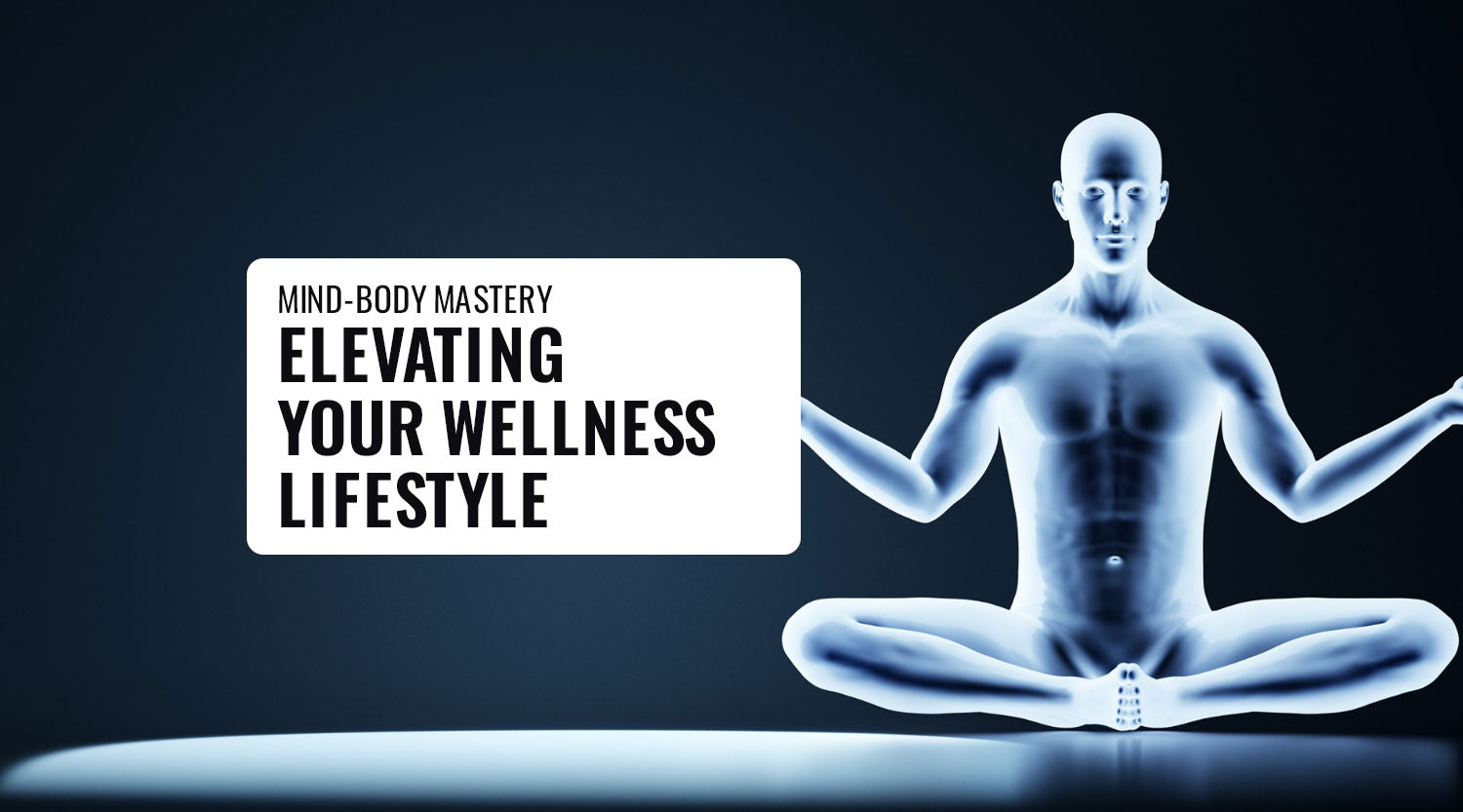
Body Mind Mastery: Integrating Holistic Health Practices for Total Wellness
In today's fast-paced world, achieving balance between body and mind has become increasingly important. Body-mind mastery is not just a trendy concept but a necessity for overall wellness. This holistic approach integrates physical health, mental well-being, and spiritual growth to cultivate a harmonious and balanced life. In this blog, we'll explore the significance of body-mind mastery, the practices that promote it, and how integrating holistic health can lead to total wellness.
Understanding Body-Mind Mastery
Body-mind mastery involves the deep understanding and synchronization of both mental and physical health. It goes beyond just maintaining a fit body or practicing mindfulness; it is about aligning these two key aspects to work together in harmony. The philosophy is rooted in the belief that the mind and body are interconnected and influence each other profoundly. When your mind is clear and focused, your body tends to function optimally, and vice versa.
The Importance of Holistic Health in Modern Life
Holistic health practices aim to address the entire person—body, mind, and spirit. Instead of isolating symptoms or focusing solely on physical aspects, holistic health looks at the interconnectedness of mental, emotional, and spiritual well-being. Modern life, with its demands and stressors, often leads to a disconnect between these components, resulting in burnout, chronic illnesses, and emotional fatigue.
Holistic health practices help prevent these issues and promote sustained wellness, offering a long-term solution to the constant challenges posed by today's fast-paced lifestyle.
Key Holistic Health Practices for Body-Mind Mastery
- Mindfulness and Meditation
Meditation is one of the most potent tools for body-mind mastery. It helps reduce stress, increase focus, and enhance emotional resilience. Mindfulness, a subset of meditation, involves being fully present in the moment. Studies have shown that mindfulness can significantly lower cortisol levels (the stress hormone), improve concentration, and boost overall mental clarity.
Daily mindfulness can lead to heightened self-awareness, emotional control, and mental discipline, which are critical components of mastering the body-mind connection. Start with simple techniques like mindful breathing or guided meditations to gradually build this habit.
- Yoga and Movement Therapies
Yoga is not just a physical exercise but a spiritual discipline that integrates mind and body through breathwork (pranayama), postures (asanas), and meditation (dhyana). Yoga helps improve flexibility, strengthen muscles, and enhance cardiovascular health. On a deeper level, yoga promotes mental clarity, emotional stability, and spiritual growth.
Movement therapies such as Tai Chi and Qigong also offer similar benefits. These ancient practices emphasize slow, deliberate movements combined with breath control, promoting a balance between mental calmness and physical strength.
- Nutritional Wellness
The food we consume directly impacts our physical and mental health. A holistic approach to nutrition involves consuming nutrient-dense foods that nourish both body and mind. Focus on whole, organic foods rich in vitamins, minerals, antioxidants, and healthy fats.
Certain foods are known to enhance cognitive function and emotional well-being. Omega-3 fatty acids, found in fish and flaxseeds, are essential for brain health, while leafy greens and berries are rich in antioxidants that reduce inflammation and improve mood.
- Breathwork (Pranayama)
Breathing is something we often take for granted, yet it holds the key to unlocking body-mind mastery. Breathwork exercises, such as pranayama, focus on controlling the breath to regulate energy flow in the body. Different techniques like deep belly breathing or alternate nostril breathing can help calm the nervous system, reduce anxiety, and improve focus.
Incorporating breathwork into daily routines can promote better sleep, reduce stress levels, and enhance overall emotional balance.
- Sleep Hygiene
Sleep is the foundation of holistic health. Poor sleep patterns can lead to both physical and mental health issues, including weakened immunity, cognitive decline, and emotional instability. To achieve body-mind mastery, prioritize sleep hygiene—create a bedtime routine that promotes restful sleep.
To improve sleep quality, avoid stimulants like caffeine before bed, limit screen time, and practice relaxation techniques such as deep breathing or meditation. Consistent, restorative sleep helps rejuvenate the mind and body, allowing you to function optimally throughout the day.
- Detoxification
Both physical and emotional toxins can accumulate in the body and mind over time, leading to imbalances and illness. Regular detoxification, through methods such as fasting, juicing, or herbal cleanses, can help rid the body of harmful substances.
Emotional detoxification, on the other hand, involves releasing negative emotions such as anger, fear, and resentment. Practices like journaling, talking with a therapist, or engaging in creative outlets can aid in emotional detox, contributing to overall mental clarity and peace.
- Social Connections and Emotional Health
Strong social connections are crucial for mental well-being. Positive relationships provide emotional support, reduce feelings of isolation, and enhance our sense of belonging. Cultivating a supportive social network is a key aspect of body-mind mastery.
Additionally, emotional health can be nurtured through self-care, self-compassion, and setting healthy boundaries. Emotional intelligence—the ability to recognize, understand, and manage emotions—plays a significant role in overall well-being and body-mind integration.

Benefits of Body-Mind Mastery
By integrating these holistic health practices, individuals can achieve numerous benefits:
- Reduced Stress: Mindfulness, yoga, and breathwork help lower stress levels, reducing the risk of chronic illnesses.
- Enhanced Focus and Clarity: Meditation and nutritional wellness improve mental function, concentration, and productivity.
- Improved Physical Health: Regular exercise, proper nutrition, and adequate sleep contribute to better overall physical health, including enhanced immunity and energy levels.
- Emotional Stability: Emotional detoxification and social connections promote emotional resilience and well-being.
- Spiritual Growth: Practices like meditation and yoga foster spiritual awareness, leading to a more profound sense of purpose and inner peace.
Case Studies and Success Stories
Real-World Examples of Transformation through Body-Mind Mastery
Our journey to holistic health is dotted with inspiring stories. Let's look at a few.
- John's Journey: John, a mid-30s accountant, felt stuck in life. His days were long and stressful. He decided to try body-mind strategies to improve. With daily mindfulness meditation and a veggie-rich diet, John transformed. His anxiety levels dropped. His energy soared. Within months, John ran his first marathon.
- Maria’s Breakthrough: Maria, plagued by insomnia, turned to yoga and herbal remedies. She developed a bedtime routine that calmed her mind and prepared her body for sleep. Her rest improved, as did her daytime alertness.
- Ethan’s Path to Peace: A doctor recommended Ethan try Tai Chi to manage his chronic pain. Along with acupuncture, Ethan started Tai Chi classes. His pain became manageable, and his mental fog lifted. He describes a new sense of inner peace.
These narratives reveal a clear message: Body-mind practices have the power to profoundly change lives. They show us how a holistic approach can lead to health and happiness.
Insights from Experts in Holistic Health and Wellness
Gaining wisdom from health leaders can be vital. We see how they apply body-mind mastery in their lives. These experts often share methods that blend modern science and ancient wisdom. They provide evidence of the powerful bond between mental and physical health. By studying their approaches, we can learn to enhance our well-being. This blog part will share expert tips and insights on holistic health practices.
How Body Mind Mastery Influences Quality of Life and Wellness
Body-mind mastery goes beyond personal health. It touches every part of life. People who master it report significant changes. They sleep better and stress less. Their relationships improve. Many say they feel more connected and happier. Their work life also gets better. They focus better and are more creative. Their health costs often drop. These are real benefits that come from this practice. It's about a lifestyle that brings balance and fulfillment.
In summary, body-mind mastery through holistic health practices is not a one-time achievement but a lifelong journey. By integrating mindfulness, movement, nutrition, sleep, and emotional well-being into daily life, individuals can experience profound improvements in their overall health. This balanced approach ensures that the mind, body, and spirit are aligned, leading to total wellness.
Embrace the journey of body-mind mastery today and witness the transformative power of holistic health practices in your life.
References:
- Brown, K.W., Ryan, R.M., & Creswell, J.D. (2007). Mindfulness: Theoretical Foundations and Evidence for its Salutary Effects. Psychological Inquiry, 18(4), 211-237. https://www.tandfonline.com/doi/abs/10.1080/10478400701598298
- Field, T. (2011). Yoga clinical research review. Complementary Therapies in Clinical Practice, 17(1), 1-8. https://www.sciencedirect.com/science/article/abs/pii/S1744388110000794
- Barnes, P.M., Powell-Griner, E., McFann, K., & Nahin, R.L. (2004). Complementary and Alternative Medicine Use Among Adults: United States, 2002. Advance Data, 343, 1-19. https://www.sciencedirect.com/science/article/abs/pii/S1543115004000389
- Mayo Clinic. (2021). Nutrition and Healthy Eating: Omega-3 Fatty Acids. Retrieved from www.mayoclinic.org
- Sletten, Tracey L., et al. "The importance of sleep regularity: a consensus statement of the National Sleep Foundation sleep timing and variability panel." Sleep Health 9.6 (2023): 801-820. https://www.sciencedirect.com/science/article/abs/pii/S2352721823001663
- Benson, H., Beary, J.F., & Carol, M.P. (1974). The Relaxation Response. Psychiatry, 37(1), 37-46. https://www.tandfonline.com/doi/abs/10.1080/00332747.1974.11023785
